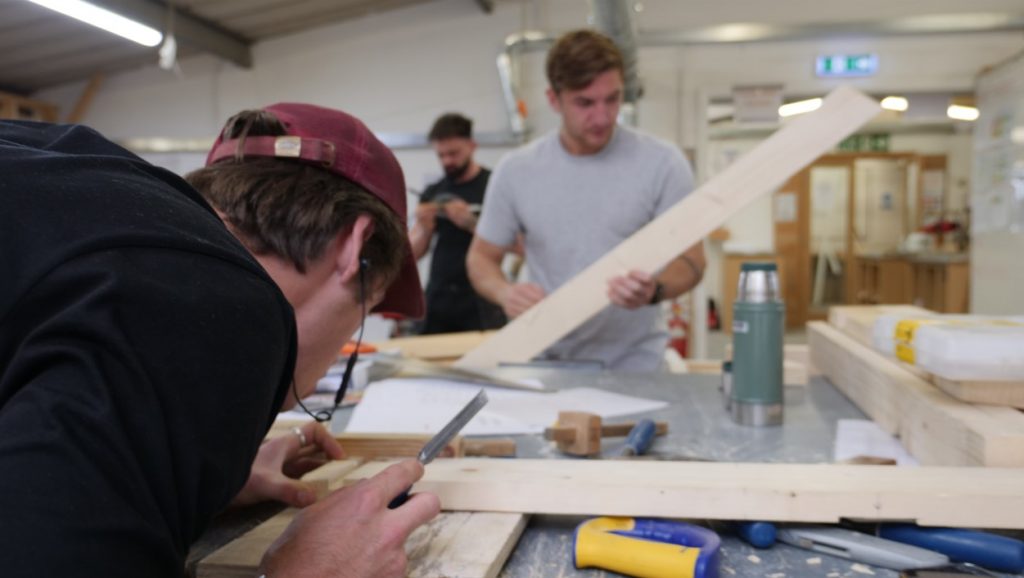
Carpentry is one of the oldest professions in the world, and while the industry might have moved on a lot since its first recorded evidence 7,000 years ago, it remains an integral part of the wider construction sector and therefore continues to be in incredibly high demand.
What does a carpenter do?
While we largely associate carpenters as solely working with wood, these days a carpenter deals with a much wider variety of materials.
Day-to-day roles and responsibilities can be incredibly varied depending on where you work, though some of the typical tasks include:
- Sharing plans and instructions with clients and site managers
- Cutting and shaping timber floorboards, doors, skirting boards and window frames
- Building and fitting structures like staircases, door frames, roofs and walls
- Assembling furniture
- Installing kitchens, cupboards and shelves
- Building shuttering to hold wet concrete in place
- Fitting interiors in shops, bars, restaurants, offices and other commercial settings
- Constructing stage sets for theatre, TV and film productions
Why are training and qualifications important to the trade?
Given the materials and tools carpenters work with, formal training is vital to truly understand how to complete work safely and to a high standard.
For carpenters who want to work on-site, you’ll need to hold a CSCS Card. To register for this you’ll need to pass a health, safety and environment test (HS&E).
Carpentry courses at Able Skills
Able Skills offers a range of expert-led carpentry courses and assessments designed to suit all levels of experience, from complete beginners right through to those who have been in the industry for years and who need formal qualifications.
Introduction to Carpentry: A short intensive course for those who want to learn basic carpentry skills or anyone contemplating pursuing further training.
City & Guilds Carpentry Course: A basic C&G accredited three-week carpentry qualification that’s an excellent starting point for anyone taking their first steps towards a career in the profession.
City & Guilds Joinery Course: A hands-on course designed to give participants a deeper understanding of constructing and assembling joints.
City & Guilds Carpentry & Joinery Combined Course: A combination of both C&G basic courses that offers a solid, well-rounded skill set for newcomers to the industry.
NVQ Level 2 Carpentry Course: An in-depth course that will cover the skills and knowledge needed to enter the carpentry industry and become NVQ qualified.
NVQ Level 2 Carpentry & Joinery Course: A ten-week course that will cover everything needed to achieve your NVQ Level 2 in carpentry and joinery, a requirement for those wanting to apply for a CSCS Card.
Accredited Carpentry Course: A bespoke course designed by our instructors that they feel, based on their own in-depth experience, meets the latest needs of the industry.
Level 2 Carpentry Diploma / Level 2 Joinery Diploma: A mix of practical and theory learning and assessments aimed at those who have a basic understanding of the construction industry, and want to come straight in at Level 2.
Level 2 Carpentry Diploma & NVQ Level 2: Again, a mix of practical and theory-based assessments, with time allocated to specific NVQ training
City & Guilds Level 3 Carpentry Diploma: A technical vocational qualification that focuses on the development of the underlying principles and practical skills required in the carpentry sector.
Experienced Carpenters who need NVQ: For experienced carpenters who don’t have a formal NVQ. This doesn’t require any site assessments, just a profiling session at Able Skills, evidence gathered by yourself and a practical test to confirm your competence.
Work-based assessments for Carpentry NVQ Level 2: For carpenters who have been working in the industry for less than five years, Able Skills can arrange the work-based assessment needed for NVQ accreditation.
Flexible carpentry training
We’re committed to making our training as accessible as possible, meaning many carpentry courses can be completed on a part-time basis over weekends rather than full-time. We also offer affordable accommodation to students who might be travelling long distances to complete their training.